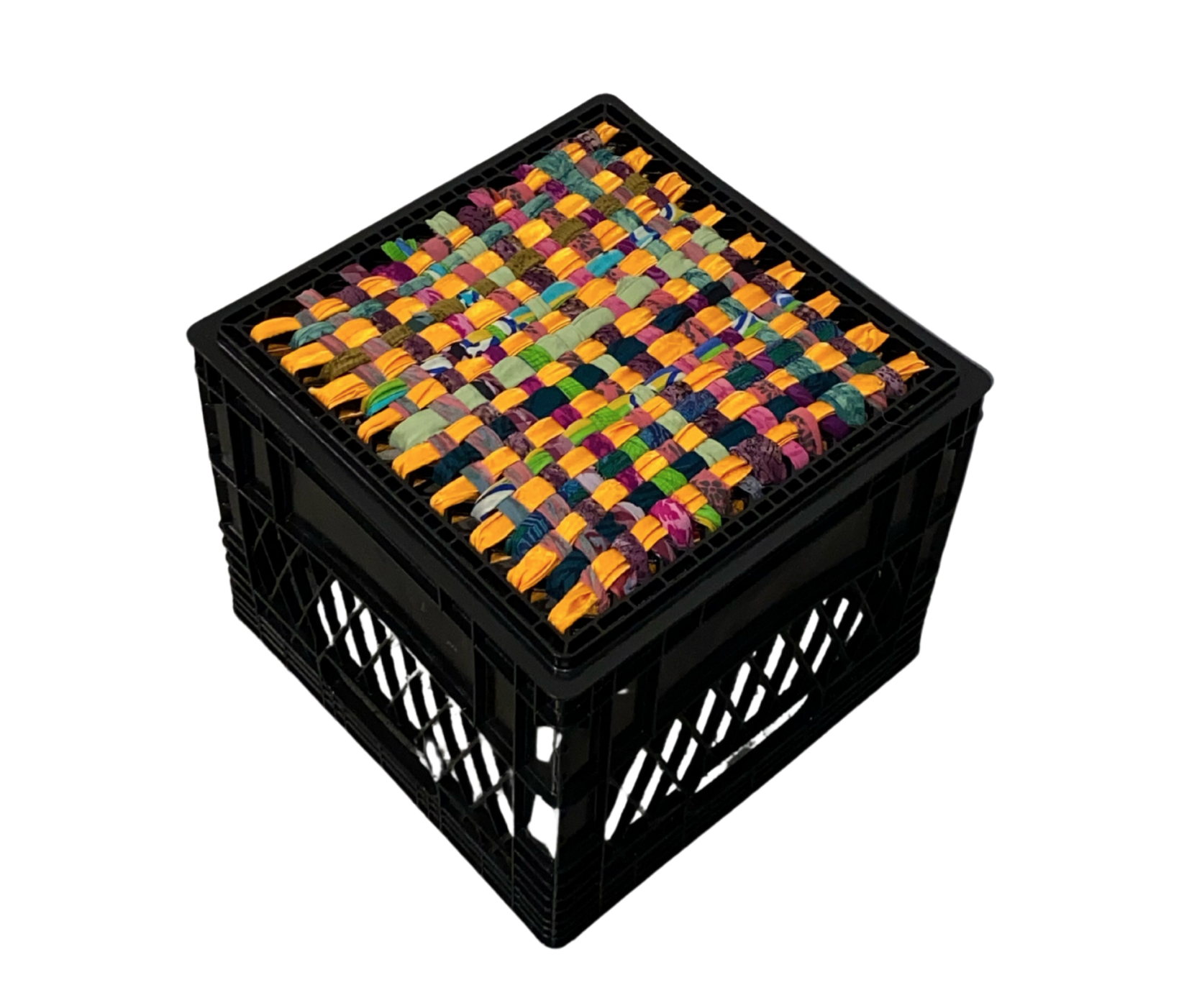Image Credit: Harmeet Rehal
Manjas as Mobility Aids, 2023
Black milk crates, repurposed saris and dupattas, rope
Image Description: A single black milk crate is pictured. The top surface of the crate has various silk sarees, embroidered Panjabi fabric, and rope woven through it both horizontally and vertically, creating a crosshatch of golden yellows, deep navy blues, hints of turquoise, vibrant patterned pinks and purples, as well as faded greens, blues, and browns. Some of the fabrics are a solid hue, while others have a pattern that peaks out from within each warp and weft.
WORK STATEMENT
Manjas are Panjabi day beds/cots that are traditionally made with a simple wooden frame and colorful hand-woven rope. While, in western architecture and design, it is rare to find accessible spaces to rest in ways that are collective and whole, in Panjabi culture, Manjas are found in shared spaces that are both indoor and outdoor. Lying down and resting while in community is a major consideration within private and public Panjabi landscapes — Manjas give us permission to rest in relation to one another and their presence viscerally shifts our shared spaces.
This piece re-imagines the traditional Manja through upcycled, hand-woven Panjabi textiles and milk crates, the latter being an extremely utilitarian material. It attempts to honour the crip, working class, and racialized ritual of finding milk crates in factories, cleaning supply closets, kitchen fridges, back alleys, and flea market change rooms and using them as a seat or propping ourselves on them to ease our bodies during taxing shifts. This crip access hacking recalibrates the normative design and purpose of milk crates into a mobility aid. Bounding crates together to form a Manja allows for a more collective mobility aid that creates room for us to relationally rest and spill over. Softening the rigidity of the crates’ structure with woven Panjabi fabrics also creates room for a gentler and softer place to land.
I welcome you to sit on the Manja, to prop yourself on it, or to stim and engage with all the different textures throughout. Stay a while, there is no rush — I want you to rest and play with this piece however feels good.
ARTIST STATEMENT
Coming from an intergenerationally disabled and immunocompromised Sikh-Punjabi family full of artists and makers who have complex experiences around displacement, state violence, survivor-hood, and substance use, I arrived at my multidisciplinary arts practice to make sense of these gritty histories and griefs. My practice is also shaped by an urgency to archive the crip knowledge from my lineage and all of the intricate and messy ways they materialize in me and around me. Within my textile work specifically, I repurpose found fabrics from my lived experience that hold complex memories and stories. Unraveling and adorning archived materials from my life allows me to give them new portals and meaning and is, ultimately, a queering and cripping that is so grounding. My textile work is also an amalgamation of all the techniques and storytelling that the crip and working class Panjabi aunties in my life passed down to me at the kitchen table. Their vast knowledge of weaving with jute, sewing, quilting, crocheting, natural fabric dying, traditional Panjabi mirror (sewing glass mirror into textile), and fabric painting shows up intimately in the ways that I approach my textile work. The slowness and crip hacks I embody in my craft are informed by these relations and my textile practice is an attempt to honor these aunties and all of the vibrant, juicy, and lush possibilities that Panjabi textiles offer us.
Artist Bio
Harmeet Rehal is a fat, trans, Disabled, Sikh-Panjabi multidisciplinary artist, educator, and organizer based in Tkaronto. Harmeet primarily does illustration, collage, painting, and textile arts and facilitates community arts programming on these mediums. They are currently an MA student in the Critical Disability Studies program at York University, where their research further explores the themes of their arts practice: pandemic care networks, intergenerational crip archives, hacking normative design, Panjabi survivor-hood, and fat temporality.
Harmeet has recently completed artist residencies at the Possibilities Podcast, ArtworksTO Program, YTB Gallery, Creative Users Project’s Sensory Shift, and National AccessArts Centre. They are also the coordinator for the Digizine Residency, a virtual zine residency for Deaf and Disabled 2SQTBIPoC. Their art has been shown at the Art Gallery of Mississauga, Spadina Museum, and sold at pop ups and markets at the Leslie Lohman Museum of Art, AGO, Hard Feelings mental health shop, and Stakt.
Harmeet also comes from an accessibility coordination and grassroots community organizing background. This work grounds the intentions of their arts practice and, in all their roles, Harmeet is interested in creating portals to a cripped otherwise.
